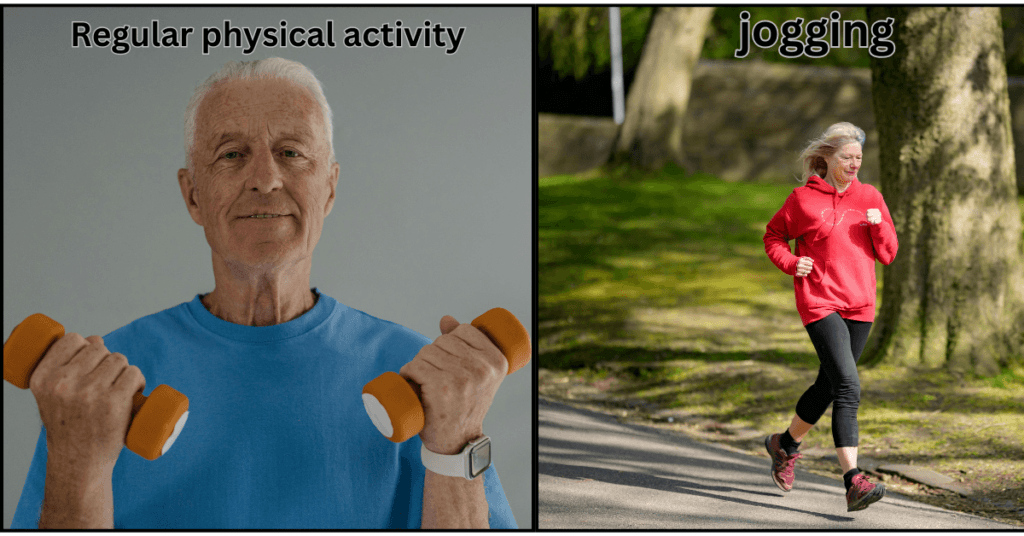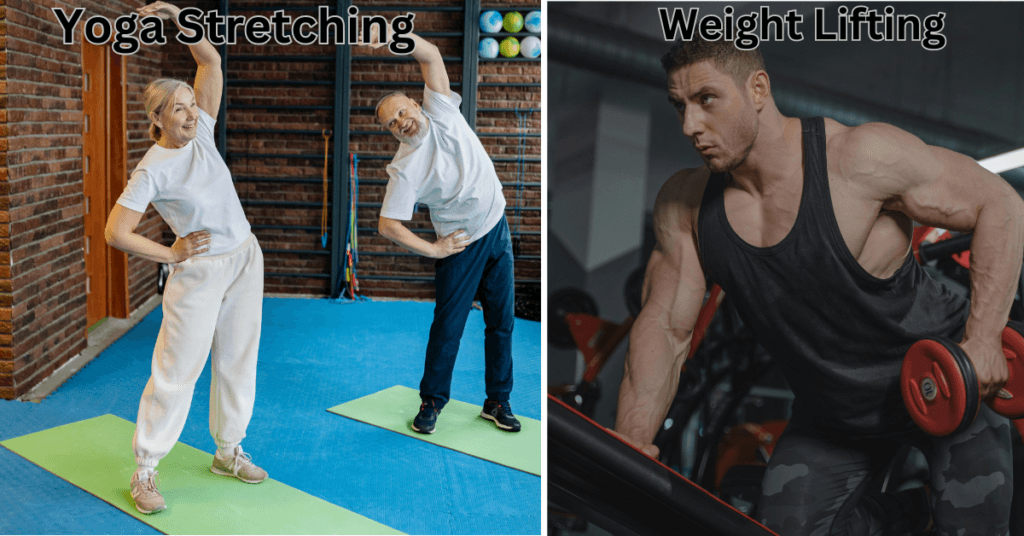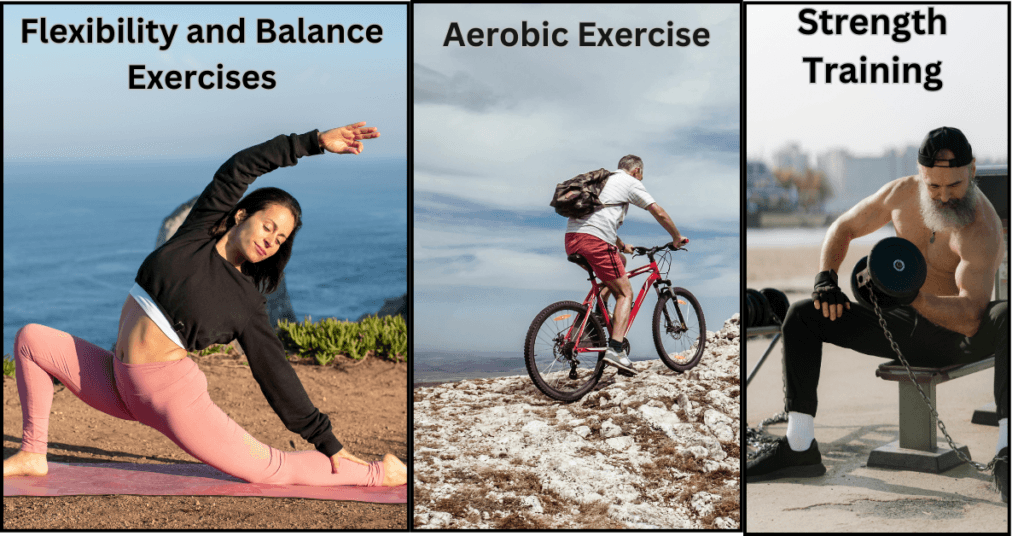(Regular physical activity has been linked to increased lifespan, improved quality of life, and a reduced risk of various chronic diseases. Let’s dive into the science and benefits of staying active and how it can impact your life expectancy)
Why Fitness is Essential for Longevity

- Improved Cardiovascular Health
One of the primary benefits of regular exercise is its positive impact on cardiovascular health. Activities like walking, jogging, cycling, and swimming help to strengthen the heart, improve blood circulation, and lower blood pressure. A stronger heart can pump blood more efficiently, reducing the risk of heart attacks and strokes, which are among the leading causes of death worldwide.
Key Takeaway: Regular cardiovascular exercise can lower your risk of heart disease, which is a significant factor in increasing lifespan.
- Enhanced Immune Function
Physical activity is known to boost the immune system, making the body more resilient against infections and diseases. When you engage in regular exercise, your body’s production of antibodies and white blood cells increases, improving its ability to detect and fight off harmful pathogens.
Key Takeaway: A stronger immune system means you’re less likely to suffer from illnesses that could reduce your lifespan.
- Reduced Risk of Chronic Diseases
Conditions like diabetes, obesity, hypertension, and certain types of cancer can significantly shorten your lifespan. The good news is that regular physical activity can help prevent or manage these diseases. Exercise plays a crucial role in controlling blood sugar levels, maintaining healthy body weight, and regulating blood pressure, all of which contribute to a longer, healthier life.
Key Takeaway: Staying active can reduce the risk of chronic diseases that are often linked to premature death.
You Can Also Try This Digital Product = Unlock Your Body [Online Course] | Member area and video courses
The Role of Fitness in Mental Health and Longevity

- Lower Stress Levels
Chronic stress is a known contributor to various health issues, including heart disease, high blood pressure, and weakened immune function. Regular exercise helps reduce stress by releasing endorphins, which are natural mood lifters. Activities like yoga, meditation, or even a brisk walk can do wonders for your mental health, ultimately leading to a longer life.
Key Takeaway: Managing stress through fitness can help protect your heart and improve your overall well-being.
- Improved Cognitive Function
Staying physically active is not just beneficial for your body but also for your brain. Regular exercise has been linked to improved cognitive function, memory retention, and a reduced risk of neurodegenerative diseases like Alzheimer’s and dementia. By keeping your brain healthy, you’re enhancing your chances of living a long, vibrant life.
Key Takeaway: Physical activity can help keep your mind sharp, reducing the risk of cognitive decline as you age.
Fitness and Its Impact on Aging

- Muscle Strength and Bone Health
As we age, muscle mass and bone density naturally decrease, leading to a higher risk of fractures, osteoporosis, and falls. Strength training exercises, such as weight lifting or resistance training, can help maintain and even build muscle mass and bone density. This not only helps you stay strong and active but also reduces the risk of injuries that can severely impact your quality of life.
Key Takeaway: Strength training is vital for maintaining mobility and independence as you age.
- Better Mobility and Flexibility
Regular physical activity enhances flexibility, balance, and coordination, which are crucial as you get older. Exercises like stretching, yoga, or Pilates can improve your range of motion, reduce stiffness, and help prevent falls, which are a common cause of injury in older adults.
Key Takeaway: Maintaining flexibility and balance through fitness can prevent falls and improve your quality of life in later years.
Types of Exercises to Promote Longevity

- Aerobic Exercise
Aerobic exercises like walking, jogging, cycling, and swimming are excellent for cardiovascular health. Aim for at least 150 minutes of moderate-intensity aerobic activity or 75 minutes of vigorous-intensity activity per week to keep your heart healthy and boost longevity.
- Strength Training
Aim to include strength training sessions in your routine at least two times per week. Lifting weights, using resistance bands, or even doing body-weight exercises like push-ups and squats can help build muscle mass and strengthen bones.
- Flexibility and Balance Exercises
Yoga, stretching routines, and balance exercises are essential to keep your joints flexible and improve your coordination. These activities are particularly beneficial as they can help prevent falls and maintain mobility as you age.
You Can Also Try This Digital Product = Unlock Your Body [Online Course] | Member area and video courses
How Much Exercise is Needed for Longevity?
The World Health Organization (WHO) recommends adults engage in at least 150-300 minutes of moderate-intensity exercise or 75-150 minutes of vigorous-intensity exercise per week. Additionally, muscle-strengthening activities should be done on two or more days per week to maximize health benefits and increase longevity.
Key Takeaway: Consistency is key. Even small amounts of regular exercise can significantly improve your health and lifespan.
Lifestyle Changes to Complement Fitness

- Healthy Diet
Combining regular exercise with a balanced diet rich in fruits, vegetables, lean proteins, and whole grains can further boost your chances of living a long and healthy life. Nutrition plays a critical role in providing your body with the essential nutrients it needs to function optimally.
- Quality Sleep
Quality sleep is vital for the body’s healing and restoration process. Aim for 7-9 hours of quality sleep each night to enhance the benefits of your fitness routine and support overall health.
- Avoid Harmful Habits
Limiting or avoiding habits like smoking, excessive alcohol consumption, and a sedentary lifestyle can greatly increase your chances of living a longer, healthier life. Fitness is most effective when combined with other healthy lifestyle choices.
Conclusion
The connection between fitness and longevity is undeniable. Regular exercise not only adds years to your life but also life to your years by improving physical and mental health, reducing the risk of chronic diseases, and enhancing the overall quality of life. Whether you’re young or old, it’s never too late to start incorporating fitness into your daily routine. Start small, stay consistent, and enjoy the journey to a longer, healthier life.
You Can Also Try This Digital Product = Unlock Your Body [Online Course] | Member area and video courses